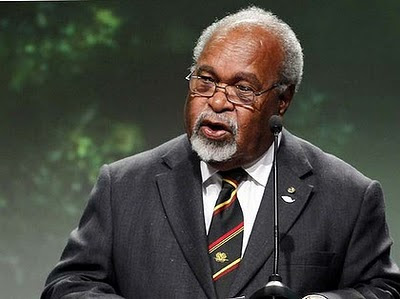When the chief bows out
Sydney Morning Herald Editorial
Read more: http://www.smh.com.au/opinion/editorial/when-the-chief-bows-out-20110703-1gxfq.html#ixzz1R5E8wvcm
IN RESOURCE-RICH developing nations the noted Oxford economist Paul Collier has observed a corrosive political culture of the ''survival of the fattest''. Democracy notwithstanding, Collier argues that a sudden rush of money into a poor economy so distorts the function of government that it is the local big men - not society as a whole - who reap the rewards. As Papua New Guinea experiences an extraordinary resource-led boom, Canberra will be hoping that Collier will be proved wrong. Particularly as it enters a new political era with the retirement last week of the ailing prime minister, Sir Michael Somare, PNG's enduring political chief. In his 43 unbroken years in Parliament, Somare was dubbed ''The Great Unifier'' for his ability to hold together fractious groups in a society dominated by local and tribal loyalties. And as PNG's founding father and first prime minister, Somare has personified the link between the Australian colonial administration of the past and an evolving, independent nation.
The coincidence of his retirement and the resources boom raises some crucial questions. First, without his unifying presence, will PNG's political contest be reduced to a factional fight within the elite over the spoils of the boom? More broadly, how will tensions be resolved between the massive flows of foreign investment into resources, logging and development - mainly from Asia - and Australia's persistent efforts to use our large aid program to fight corruption and to promote good governance?
Advertisement: Story continues below
PNG's economy is expected to grow faster than China's this year and massive new liquefied natural gas projects alone promise to push GDP up by 20 per cent. Other projects are following the resources money, like a proposed $480 million special economic zone and new city on the island of Bougainville, site of a massive copper mine closed during the secessionist conflict.
Yet despite the frenzied exploitation of its natural riches, PNG stands at 137th on the UN's Human Development Index, at 154th on Transparency International's corruption index and in 2008 the Auditor-General estimated corrupt officials were stealing $356 million a year in a nation with an annual GDP of just $13.4 billion. The post-Somare generation of politicians is concurrently facing unprecedented opportunity alongside chronic problems of inequality, crime, environmental damage and the failure of basic service delivery. For Australia, PNG represents both a historic responsibility and a strategic priority.
There is little choice but to keep banging, and funding, the good-governance drum, because only strong institutions can ensure resource wealth is translated into stability and prosperity - not just for the fattest, but for all.
Read more: http://www.smh.com.au/opinion/editorial/when-the-chief-bows-out-20110703-1gxfq.html#ixzz1R5E8wvcm








Comments
Post a Comment
Please free to leave comments.